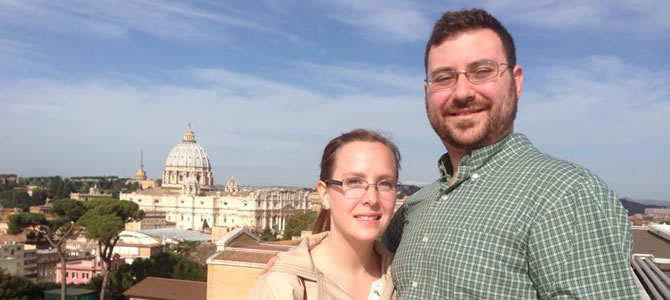Note: The following text is intended to give a basic overview of the convalidation process. Because every couple’s situation is unique and because practices related to the implementation of the process may vary from diocese to diocese, persons interested in pursuing a convalidation and/or a declaration of nullity should speak with their parish priest or a professional at the local Tribunal.
“It is the presence of the Lord, who reveals Himself and the gift of His grace, that will render your marriage full and profoundly true.” – Pope Francis
Is my Marriage Recognized by the Church?
Like other couples in your parish or family, you may be wondering if your marriage is fully recognized by the Catholic Church. Catholic Church law ordinarily requires baptized Roman Catholics to marry before a priest or deacon. Unless they received a “dispensation from canonical form,” Catholics who exchange vows in the presence of ministers from other religious traditions or civil officials are not considered validly married in the eyes of the Catholic Church.
Regardless of what happened in the past, the Catholic Church invites you to bring new meaning to your lives by embracing the vocation of marriage and dedicating your family’s mission to sharing God’s love.
Why Marry Catholic?
Catholic Marriage is unique among other marital relationships because it is a sacrament that makes Christ present in our world. The relationship between husband and wife mirrors the relationship of Jesus Christ for his people. In the Catholic tradition, husband and wife accept a role in God’s plan for humanity. They are ambassadors of God’s love, and they collaborate with God to keep humanity alive.
The vows exchanged by the couple are a sacred pact through which the spouses embrace each other, and, together, embrace Jesus as their partner. Through their union with Christ they participate in the unbreakable pact between God and humanity: the covenant that was sealed in the death and resurrection of Christ.
Benefits of Catholic Marriage
One of the many benefits of a sacramental marriage is the power of God’s grace, which helps couples keep their commitment and find happiness together. Social scientists are finding that couples who recognize God’s presence in their relationship experience more satisfaction and are more likely to achieve lifelong marriage.
All in all, couples who choose to bring their marriage into the Church receive many gifts – peace of heart, oneness with the Church, the fullness of the sacraments, and God’s special blessing upon their marriage.
What if there is a Prior Marriage?
In the simplest terms, if a Catholic wishes to marry in the Church when there has been a previous marriage for either party, the partner in the earlier union must have died or the Church must have issued a declaration of nullity (frequently called an annulment) of the previous marriage.
The Catholic Church views all true marriages with respect. It presumes that they are valid. Thus, it considers the marriage of two Protestant, Jewish or even non-believing persons, any of whom marry according to their own tradition, to be binding in the eyes of God. Consequently, a tribunal process is required to establish that an essential ingredient in the relationship was missing from the start of the previous marriage.
For Catholics with a prior marriage outside the Church, the declaration of nullity is based on what is called a “lack of canonical form.” For Catholics with a prior “valid” marriage, the tribunal process is termed a “formal case.” Catholics should consult with their pastor if a declaration of nullity is needed.
Three Things that Make Marriage Valid in the Church
Three things need to be in place for a true (valid) marriage: capacity, consent, and canonical form. A valid Catholic marriage comes into existence when a man and woman who are capable, give consent to a true marriage, including all the essential properties of marriage, and exchange this consent in the proper form for Catholic weddings.
Convalidation is not simply a “blessing” of an existing union. It requires that a new, free act of consent be made.
Capacity
- Psychological capacity (emotional maturity and stability)
- Physical capacity
- Freedom from impediments (e.g. a prior marriage, vows in a religious order, etc.)
Consent
- To a lifelong marriage
- To an exclusive marriage
- To a marriage that is open to children
Canonical Form
- To be married in the presence of a Catholic bishop, or a priest or deacon delegated by either the pastor or bishop, and two witnesses according to the Order of Celebrating Matrimony.
NOTE: Special permission is required for Catholics to marry in a place other than their parish church.
Ten Steps toward Convalidation:
- Contact your local parish for an appointment with your pastor or his delegate to discuss the situation and determine what must be done.
- Obtain a new copy of the baptismal certificate for the Catholic party (or parties). Make that request to the parish where the person was baptized. If the parish no longer exists or baptismal records are unavailable, contact the Chancery office of that Catholic diocese for assistance.
- Begin collecting the necessary paperwork for the Pre-Nuptial Investigation.
- Participate in formational sessions with a mentor couple, priest or deacon in the parish to prepare you for sacramental marriage; take a Natural Family Planning Class (http://www.usccb.org/issues-and-action/marriage-and-family/natural-family-planning/find-an-nfp-class.cfm).
- If there is a prior marriage for either party, seek a Church declaration of nullity.
- As part of your formational sessions, you may be asked to complete a premarital inventory to identify strengths and areas for growth in the relationship.
- If married civilly two years or less, attend a parish or diocesan marriage preparation program (some examples listed here); if previously married, discuss with the priest or his delegate options for specialized preparation.
- If married more than two years it is highly recommended that you attend a marriage enrichment weekend or event (some examples listed here).
- Determine the date and most suitable type of ceremony. For two Catholics, a nuptial Mass is suggested so that the first meal shared by the couple is the Eucharist, the source and summit of our faith. Plan a joyful get-together that will follow the liturgical service to celebrate the Church’s recognition of your marriage.
- Celebrate the Sacrament of Reconciliation and become actively involved together in your parish community.
Copyright © 2016, Diocese of Trenton. All rights reserved. Altered and used with permission. To order copies of this information in pamphlet form, visit http://www.dioceseoftrenton.org/convalidation.





